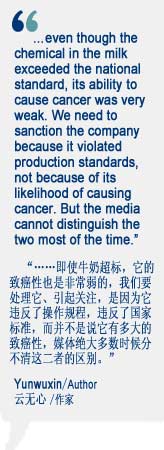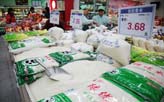Transcript·文字實錄
馮欣:“民以食為天”——這句中國的古話說明食物是一個人生活中最重要的東西。我們《解析中國》近兩期的民意調查似乎也驗證了老祖宗的智慧,我們的觀眾連續兩次將食品安全列為生活中最關注的問題,超過對房價、醫療衛生、教育等問題的關注。是什么讓大家如此關注食品安全?我們的食品到底有多安全?
Feng Xin: "Min yi shi wei tian"- This ancient Chinese idiom describes food as the most important thing in a person's life. Two of our recent polls on Digest China's website seemed to have proven this wisdom. Our viewers twice ranked China's food safety as the most concerning issue in life – ahead of other things like housing prices, healthcare and education. What concerns people so much about food safety? How safe is our food?
馮欣:在我們探討這些問題之前,我想先邀請您加入我的小小購物之旅,就像您平常去的一樣。
Feng Xin: Well, before we get into these questions and meet our guests, I'd first like to take you for a short shopping trip just like the ones you often have.
馮欣:我倒了一杯剛買的牛奶,我怎樣知道這杯牛奶是安全的呢?這里有幾種假想的情況可以導致這杯牛奶不安全:第一種情況,這牛奶可能已經過期了,即使商標說沒有;第二,這牛奶可能是假冒偽劣產品,比如,它是由淀粉做的,而不是鮮奶,或者廠家添加了食用色素讓它看起來更白;第三種情況——可能也是最糟的,牛奶是有毒的,廠家也許添加了三聚氰胺讓牛奶看上去含更多蛋白質。我怎樣知道我端的這杯牛奶不包含以上任意一種情況呢?我怎樣知道我的食物是安全的呢?
Feng Xin: I poured a glass of milk I just bought from the supermarket. How do I know if the milk is safe to drink? Hypothetically, there could be several situations that would make this glass of milk unpleasant, or even unsafe. Case number one – the milk might have expired or gone bad already, even the label says not. Case number two – the milk might be fake, for example, it was made of starches rather than a cow's fresh milk. Or edible coloring agents may have been added to make it appear white. Case number three – perhaps the worst of all – the milk might be poisonous. The manufacturer might have put melamine in it to make it appear to contain more protein. How do I know the glass of milk I'm holding doesn't involve any of the situations? How do I know my food is safe?
馮欣:我們首先跟嚴衛星聊了聊,他是國家食品安全風險評估中心的秘書長,也是全國政協委員。
Feng Xin: First, we talked to Yan Weixing, secretary-general of the safety committee under the China Food Safety Risk Assessment Center. Yan is also a member of the Chinese People's Political Consultative Conference.
馮欣:嚴委員,首先我想問您一個比較基本的問題,您覺得什么樣的食品才是安全的食品?您對安全食品的定義是什么?
Feng Xin: Mr Yan, I'd like to start with a basic question: What's your definition of safe food?
嚴衛星:我想用我們老百姓比較容易理解的話來說,對我們的健康不帶來危害的食品,那它就是安全的食品。
Yan Weixing: If we use plain words that ordinary people can understand, food that doesn't bring harm to our health is safe food.
馮欣:怎么去界定什么樣的食品是安全的?什么樣的食品是不安全的?
Feng Xin: How do you distinguish between safe and unsafe food?
嚴衛星:現在國家有一系列的規定,國家的標準,那么標準是一個評判的手段,當然我想標準也不是唯一的評判手段。我們《食品安全法》有一系列的要求,要求它的原料、生產過程。把這些綜合起來,這樣它才是一個合格的、安全的食品。當然食品安全標準的制定是在正常生產狀態下,要跟非法添加這些犯罪的行為分一分。
Yan Weixing: China now has a series of regulations, or national standards. That's one way to decide. However, I don't think it's the only way. Our Food Safety Law has a series of requirements, regulating the raw material and production processes of food. Only when integrating all these items can we decide whether a type of food is safe. Of course, food safety standards are made according to normal production conditions. We need to separate these from criminal behaviors.
馮欣:這個是什么意思能不能解釋一下?
Feng Xin: What do you mean?
嚴衛星:你想,違法犯罪的問題,跟標準沒有關系。你制定再嚴的標準,他要犯罪他還是犯罪的。總體來說我們國家食品安全是有保障的,而且我們在還不斷地向好的方面發展。那么現在大家可能看到的比較多的問題,是不斷出現的一些沒有良心的違法犯罪的行為,添加了些非食用物質。比方說我們2008年三聚氰胺的問題,它本來就不是一個食品中應該有的東西,他人為地為了追求他的目的添加了。但是如果把這些行為跟我們食品所固有的那些安全問題,把它稍微分離一下以后,大家可能就不會覺得我們的食品安全會那么一團糟。
Yan Weixing: Well, look at it in terms of crimes; they have nothing to do with standards. No matter how harsh you make the regulations, if somebody wants to commit a crime he will still do it. Generally speaking, our food safety is guaranteed, and we are still heading toward a better future. What people see most often nowadays are constant crimes committed without any conscience, like adding non-edible substances to food. For example, milk was tainted with melamine in 2008. It wasn't supposed to be a substance in food at all but was purposefully added to milk. If we separate these crimes from some inherent food safety issues, people would probably not think our food safety is that bad.
馮欣:您覺得我們現在公眾對于食品安全存在什么樣的誤解?
Feng Xin: How do you think the public misunderstands food safety issues?
嚴衛星:我現在這么講吧,我們先把大家所認為的食品安全問題,分析一下原因。第一塊,我覺得是在正常生產狀態下,出現的一些不可避免的、非人為的一些污染物進入到食物鏈中來。我們環境中有那么多污染物,它必然要進入食物鏈。我們在生產過程中要使用農藥,我們在養殖過程中要使用獸藥,我們不能不使用。剛剛說了,我們的植物不用農藥,產量就保證不了。產量保證不了,我們基本上吃飯問題,飽的問題都解決不了,量的問題都解決不了。
Yan Weixing: Let me put it this way. Let's look at some factors which can contribute to food safety hazards. I think the first category of factors occurs during normal production processes, when some contaminants enter our food chain. There are so many contaminants in our environment, and they will inevitably enter the food chain. We use pesticide when growing plants. We use veterinary drugs when feeding animals. We have to use them. If we don't, we won't be able to guarantee our volume of production, and therefore we won't even have enough food to eat.
馮欣:那這是一個矛盾。
Feng Xin: That's a dilemma.
嚴衛星:是一個矛盾。所以一方面我們研究一些低毒的農藥,殘留少的、對健康影響小的農藥,在研究上要加強這方面的工作。那么在使用上,合理規范的使用,我們建立規范使用農藥的操作規程。再往下我們制定了一個相應的殘留限量標準,只要在這個標準之內,它對健康就不帶來問題。通過多種手段把這些非人為的、我們必須要用的這些污染物把它控制住。
Yan Weixing: It is a dilemma. So on the one hand, we research and develop some harmless pesticides, which have little influence on human health. We need to work on that. On the other hand, we need to train farmers to follow some operational standards when using pesticides. We also made national standards for pesticide residue. As long as it's within the range, it won't affect human health. By taking multiple approaches, we control these contaminants.
嚴衛星:第二塊,我們再講——我們分析原因嘛,給食品帶來風險的原因。第二塊呢,我們說一些假冒偽劣、以次充好(的食品),那么假冒偽劣以次充好這里面,有的時候它可能會存在安全問題,有的時候它可能不會存在安全問題。比方說用淀粉來冒充奶粉,當淀粉冒充奶粉給成年人吃的時候,可能它不會帶來太大的風險,因為我們食物很多樣。當冒充奶粉給孩子吃的時候,它可能就帶來了安全問題,它營養不夠啊。當然這個淀粉是食用的淀粉,就是大米磨的或者用紅薯做的淀粉。
Yan Weixing: Now let's talk about the second category of factors, which bring risks to food. They are forged, or fake, food products. Among these, some may cause safety problems. Some may not. For example, a manufacturer uses starches to forge milk powder. When such milk powder is consumed by adults it might not cause a big problem, because adults eat a variety of food. However, when the milk powder is consumed by babies it might cause a big problem, because it doesn't contain enough nutrition. Of course, this is when we assume the starches are made of rice or sweet potatoes.
嚴衛星:我們再舉一個例子,有些面條不用雞蛋,用我們允許使用的色素,弄得黃黃的顏色冒充雞蛋掛面,它可能不會有安全問題。當它添加了一些東西,是非食用物質的時候,那肯定給安全就帶來問題。他不使用食用的色素,使用工業的色素,它肯定帶來安全問題。
Yan Weixing: Let me give you another example. Some manufacturers use food coloring agents rather than eggs to make dried noodles appear yellow. This might not cause a safety problem. But if the manufacturers add substances that are not edible they will definitely bring a safety hazard, because the substances are not food coloring agents but industrial coloring agents, which are definitely harmful to food safety.
嚴衛星:第三塊,就剛剛我們討論的非食用物質的添加,瘦肉精的問題,三聚氰胺的問題,還有工業染料的問題等等,不斷的一系列出現這些問題。
Yan Weixing: Let's talk about the third category of factors - non-edible substances, like "lean meat powder", melamine, as well as industrial dye, that we often see.
馮欣:在理清了幾種我們可能遇到的食品風險以后,再回到這個問題:我們的食品到底有多安全?
Feng Xin: After sorting out the types of food risks or danger we might face, how safe is our food after all?
馮欣:2011年,清華大學和《小康》雜志聯合做了一個調查,《小康》是中共機關刊物《求是》下的一本雜志。這個調查在全國所有省份進行,訪問了超過1000位受訪者。調查顯示超過六成的受訪者認為中國的食品安全形勢嚴峻,八成以上的受訪者擔心食品安全問題。那么這些看法是否反映了真實的情況呢?
Feng Xin: In 2011, Tsinghua University and Insight China, a magazine under the Chinese Communist Party publication Qiushi, conducted a survey with more than 1,000 respondents from all Chinese provinces. The results show that more than 60% of respondents think the food safety situation in China is “very severe”. More than 80% worry about food safety. Do these perceptions reflect the real situation?
馮欣:我們在演播室撥打了云無心的電話,他寫過幾本關于食品安全的著作,現在正在美國普渡大學食品工程系攻讀博士研究生。
Feng Xin: We called Yunwuxin from our studio. He is an author who has written several books on food safety and is currently doing his PhD studies in Food Engineering at Purdue University in the United States.
馮欣:云無心先生,超過六成的受訪者認為我們國家食品安全形勢嚴峻,八成的人對當下的食品沒有安全感,您認為原因是什么?
Feng Xin: Mr Yunwuxin, more than 60 percent of respondents think the food safety situation in China is very severe. More than 80 percent worry about food safety. What do you think is the reason?
云無心:我覺得這里邊有一個很關鍵的(詞),“安全感”。最關鍵的是說消費者缺乏安全感,其實這個安全感跟食物的安全狀況還不是直接相關的。當然中國食品新聞太多,層出不窮,這個確實有現實國情的原因。因為像國外的食品繁類相對中國來說要容易得多,因為它(們)的產業化非常成熟,都是有一個大企業就占據了整個市場的絕大部分。只要政府抓住那幾個企業,這個市場上的食物基本上就不會出大問題。而中國是正好相反,中國百分之八十以上的食品是來自于非常小的作坊或者企業,這些企業政府監管起來是非常困難的。這是一個現實的原因。
Yunwuxin: I think a key phrase here is "sense of security." Consumers lack a sense of security. In fact, such a sense isn't directly related to the food safety situation. Obviously, China has so many news reports about food. This is due to China's circumstances. Other countries have significantly less categories of food than China, because their degree of industrialization is very high. Usually a huge corporation takes over a bulk of the market. The government only needs to monitor the few big corporations. The food in this particular market usually won't have any big problems. China is the opposite case. More than 80 percent of food supply comes from small workshops or enterprises. It's extremely difficult for the government to supervise all of them. This is one reason.
云無心:另外一個原因是,現在中國的媒體對于食品新聞的報道缺乏理性,非常非常不專業。我在去年年底寫了《2011年中國食品新聞盤點》,經過仔細的分析,去年所有的著名的食品安全事故,我發現大多數讓公眾非常擔心的食品安全事故都是媒體炒作的結果,它實際上根本就不是問題。
Yunwuxin: Another reason is that many Chinese media lack rationality and professionalism in their reporting on food safety news. I wrote an article at the end of last year, "An account of China's food safety news in 2011". Through my detailed analysis, I found many well-known food safety incidents – those that made the public very worried – are a result of the media's sensationalism. They are, in fact, not problems at all.
馮欣:那您能不能舉個例子?
Feng Xin: Can you give us an example?
云無心:比如說去年的西瓜膨大劑、草莓膨大劑,這些報道完全背離了科學現實,就是說這些東西根本就沒有害。即使是像去年年終蒙牛的黃曲霉超標事件,這個事件是一個非常明顯的、確確實實是違反了國家標準、毒素超標的事件,要對它進行處理是完全合理的。但是超標的牛奶本身(的危害)并沒有媒體所渲染的那么大。
Yunwuxin: For example, watermelons and strawberries were found to contain growth-accelerating chemicals last year. These reports completely departed from scientific truth. In fact, these chemicals are not harmful at all. Another example is the dairy company Mengniu, which added more aflatoxins in its milk than the required limit. This was a clear violation of the national standards. Any punishment would be reasonable. However, the milk itself was not as harmful as what the media described.
云無心:實際上正如中國農業大學食品學院羅云波院長說的,即使牛奶超標,它的致癌性也是非常非常弱的。我們要處理它、引起關注,是因為它違反了操作規程,違反了國家標準,而并不是說它有多大的致癌性,媒體絕大多數時候分不清這二者的區別。
Yunwuxin: Like Luo Yunbo said, who is the dean of College of Food Sciences at China Agricultural University, even though the chemical in the milk exceeded the national standard, its ability to cause cancer was extremely weak. We need to sanction the company because it violated production standards, not because its likelihood of causing cancer. But the media cannot distinguish the two questions most of the time.
馮欣:那媒體除了負面的影響以外,有正面的影響嗎?
Feng Xin: Apart from negative influence, do the media exert any positive influence?
云無心:正面的影響就是說,促進了有關部門采取一些行動。
Yunwuxin: A positive influence would be that the media pushed some government agencies to take action.
馮欣:那我再回到剛才講到的問題,公眾對食品的安全感,這種感受。是我們過于恐慌呢,還是說我們現實的食品安全狀況就是這么糟?
Feng Xin: Let me get back to what we just talked about: the public's sense of security, the feeling. Are we too scared, or is our food safety situation really that bad?
云無心:我覺得是這個恐慌被放大了。我們每個人都希望有絕對安全的食品,但這是不可能的。食品總是有風險的,所以一旦有一點風險,就會被媒體無限放大,公眾就會產生非常大的恐慌。
Yunwuxin: I think the scare is exaggerated. We all want to have absolutely safe food, but this is impossible. Food always has risks. So once there is a tiny risk it will be exaggerated by the media, and the public will get very scared.
馮欣:我們剛才說了媒體,那我們現在來說說公眾。《小康》雜志和清華大學的調查還顯示,中國消費者最擔心的五個問題包括:第一,蔬菜水果中農藥殘留超標;第二,食品中違規使用添加劑;第三,病死的牲畜肉;第四,添加有毒有害物質,比如三聚氰胺這樣的;第五,是非食用油,比如地溝油、泔水油。您認為公眾有理由擔心這些問題嗎?
Feng Xin: We just talked about the media. Let's talk about the public. According to the survey conducted by Insight China magazine and Tsinghua University, Chinese consumers are most worried about five food safety issues, including: first, pesticide residue; second, excessive use of food additives; third, meat from the carcass of a sick animal; fourth, non-edible substances like melamine; and fifth, non-cooking oil, like swill-cooked dirty oil. Do you think the public has a reason to worry about these problems?
云無心:對這些問題的擔心是合理的,我們確實應該關注這些問題,而且這些問題應該由主管部門來監控。農藥這個問題——實際上現在用的農藥,毒性并沒有大家想象的那么強,也不是說(食物)上邊有農藥,超標了一點,就能夠有多大的危害。農藥殘留的安全標準是個執法標準,是說超過這個限度應該引起我們的注意,我們要去執法,要控制它,因為它都留了一個比較大的安全余量,并不是說一旦超過這個(限度),馬上對你身體有多大危害。
Yunwuxin: Yes, it's reasonable to worry about these problems. We should pay attention to them, and supervision agencies should take care of these problems. In terms of pesticide– in fact, the pesticide we now use is not as poisonous as most people think. A little pesticide that exceeds the national standards will not do much harm. The pesticide residue standards are for law enforcement, meaning once the chemicals exceed the limit our attention should be drawn and supervision agencies need to control them. The standards usually leave a big safety allowance. They don't indicate that once chemicals exceed the limit they will harm you.
云無心:而食品添加劑的問題,實際上中國的食品添加劑有2400多種,其中真正容易濫用、容易超標使用的,也就那么幾十種。而且這幾十種很多即使超標了,考慮到你不可能說長期大量地吃這個食品,它的危害還是沒有大家想象的那么大。據我所知,真正食品添加劑濫用產生危害的,就是那些非法使用亞硝酸鹽來做腌肉、炸雞。他用的實在太多了,沒有控制,會產生一些中毒事件。其它的那些食品添加劑,即使說超標了,也不大可能讓你的攝入量到了危害身體的地步。
Yunwuxin: About food additives– there are about 2,400 kinds of food additives in China, and only a few dozen of them are likely to be abused. Even if these few dozen are overused, since it'd be impossible for you to eat a particular type of food for a long time, the harm is still not as serious as people think. As far as I know, the additive that can really do harm is nitrite that is illegally used in smoked meat and fried chicken. Many producers use too much and cause food poisoning accidents. Other additives, even if they are overused, will not likely reach an amount that will cause you harm.
馮欣:兩位專家都解釋了可能導致公眾恐慌的一些誤解和錯覺,那么食品安全確確實實存在的問題呢?我們采訪了雷曉凌,她是全國人大代表,也是食品安全專業的教授。
Feng Xin: While both experts explained the misunderstanding or misconception that might have contributed to the public's health scare, what about the real food safety issues that do exist? We talked to Lei Xiaoling, a National People's Congress deputy and professor in food safety.
馮欣:您認為我們現在食品安全存在的最突出的問題是什么?
Feng Xin: What do you think is the most significant problem with our food safety?
雷曉凌:食品安全突出的問題我覺得——我也一直在想最突出問題是什么。因為其實我們現在從檢測能力和力度來說,跟國外比并不差。我們很多需要檢測的項目,基本上也都檢測了。另外我們抽查的頻率、樣品量也不算少,我們的監管人員比別人還多。所以我覺得食品安全出現的問題可能還是在于我們有些時候懲罰力度不夠。另外,我們的食品還是存在多頭管理,可能這里存在一個責任不是很明確的問題。
Lei Xiaoling: I think the most significant problem– I've also been thinking about this question. In fact, our testing ability and enforcement isn't any less adequate than other countries. We test pretty much all the required items. The frequency of our inspection and sample size isn't small. We also have more supervision personnel than other countries. Therefore, I think the main problem, perhaps, lies in the fact that the punishment isn't severe enough. Also, there are multiple departments overseeing our food safety, so their responsibilities might not be very clear.
馮欣:我舉個例子,比如說一盒牛奶,它從被生產出來到走上我們的餐桌,要經過哪些部門的監管,然后要經過哪些環節才能最后流通到我們的餐桌上?
Feng Xin: Take an example of a carton of milk. What supervision departments, or stages of supervision, does it have to go through from the moment it's produced until it arrives on our table?
雷曉凌:詳細我也不敢說很清楚,但是最起碼它在工廠出廠前是經過檢驗的,工廠本身是要檢驗的。另外就是質量監督部門,一般也會抽查、抽檢。那在流通環節,工商管理部門應該也會檢查,然后再到消費者手里。所以我們也是在呼吁,是不是可以整理、整合一些監管部門,包括檢測部門,這樣可能會更有效地提高食品的監管力度。
Lei Xiaoling: I can't tell for sure, but at least it should be tested before it goes out of the factory, meaning its manufacturer has to do the testing first. Then it's the quality inspection department, which usually makes sample tests. At the stage of sales, the industrial and commercial departments should also inspect it. It then arrives to the consumer. So now we've been pushing to integrate some supervision departments, including testing departments, so that we can improve efficiency in the supervision of food safety.
馮欣:雷曉凌代表提到政府對食品安全“分段管理”,這究竟是怎樣的一個系統?如何運作?我們又如何能讓我們食品更加安全?我們將在下一期節目解析這些問題。
Feng Xin: NPC deputy Lei Xiaoling mentioned the government divides the supervision of food safety into separate parts. What exactly is the system like? How does it work? And what can we do to make our food safer? In our next episode, we will look into these questions.
Archive · 往期

What makes it difficult for graduates to find jobs?
大學生就業難,難在哪?
Why do we often hear stories about college graduates unable to find jobs? -- 為什么我們經常聽到畢業生找不到工作的事?
Does China have enough jobs for college graduates?招工難,難在哪?
What makes it difficult for employers to recruit enough workers? And what makes it difficult for job seekers to find such employers? 是什么造成了用人單位的“招工難”?又是什么讓求職者難以找到這些雇主?
Does China have enough money to fund its pensioners?
中國有沒有足夠的養老錢?
How much money can we receive after we retire? At what age should we start planning our retirement? 退休后我們到底能領多少錢?到什么年齡應該計劃養老問題?
Should Chinese people retire later?
中國人是否應該晚退休?
In what social context is the government’s proposal to push back China's retirement age rooted? 6月5日,人力資源和社會保障部提出,未來會逐步將退休年齡推遲五年。這樣做有什么深層的社會原因?
Illegal immigrants: China's rise as a land of opportunity?
“三非”外國人:中國成為機會之地?
Is the increase of incidents involving illegal immigrants a symbol of China's rise as a land of opportunity? -- "三非"外國人日益增多,是否意味著中國成為機會的土壤?
Legislating domestic violence in China: Concepts - 中國反家庭暴力立法:概念
Digest China explores the concept of domestic violence and the difficulty in proving it. 本期探討“家庭暴力”這個概念的本身和取證的困難。
Legislating domestic violence in China: Obstacles - 中國反家庭暴力立法:難點
Digest China explores some decade-long obstacles and difficulties in the process. 本期《解析中國》探討中國反家庭暴力立法進程中長期存在的阻力和分歧。Topic · 本期話題
“Min yi shi wei tian”- This ancient Chinese idiom describes food as the most important thing in a person’s life. Two of our recent polls on Digest China’s website seemed to have proven this wisdom. Our viewers twice ranked food safety as the most concerning issue in life – ahead of other things like housing prices, healthcare and education. What concerns people so much about food safety? How safe is our food?
“民以食為天”——這句中國的古話形容食物是一個人生活中最重要的東西。在《解析中國》近兩期的民意調查中,我們的觀眾連續兩次將食品安全列為生活中最關注的問題,超過對房價、醫療衛生、教育等問題的關注。是什么讓大家如此關注食品安全?我們的食品到底有多安全?
Poll · 投票
The host · 主持人
無論在英國、美國還是中國做記者,馮欣對新聞的熱情始終如她第一天跨入這個行業時那么高。更多內容>>>









